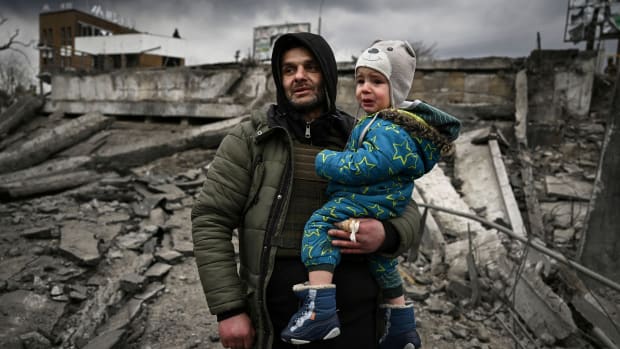
More than a year into Russia's invasion of Ukraine, the day-to-day of the war has largely been absorbed into the wider headlines of global news -- Western support is helping Ukraine maintain its territory and stave off Russian advances but non-stop Russian attacks keep fueling a prolonged and deadly war without a clear end in sight.
Now in its 13th month, the war displaced more than 10 million people both within Ukraine and in neighboring countries, destroyed billions of dollars in Ukrainian infrastructure and crashed both Ukraine and Russia's economy as the latter was hit with sweeping sanctions over the war.
DON'T MISS: These Are All The Big Companies Pulling Out Of Russia
Globally, the war sent the price of energy spiking in Europe, exacerbated already-rampant inflation and the supply chain and inflamed Western tensions between countries such as China and India due to their growing alliances with Russia.

ARIS MESSINIS/AFP via Getty Images
Here's Why The Head Of JP Morgan Is Very Concerned About Ukraine
In a Monday interview with Bloomberg Television, JPMorgan Chase (JPM) CEO Jamie Dimon called the war in Ukraine "the most serious geopolitical thing we've had to deal with since World War II."
He said that effects on the supply chain and the global economy can take months or even years to be felt for the average consumer but cannot be underestimated in their magnitude.
"The thing I worry the most about is Ukraine," he told Bloomberg Television in an interview Monday morning. "It's oil, gas, the leadership of the world, and our relationship with China -- that is much more serious than the economic vibrations that we all have to deal with on a day-to-day basis."
U.S. tensions with China (which in recent months has been helping prop up the Russian economy against Western warnings) are also concerning Dimon due to American dependence on semiconductors.
Worsening relations could lad to a crackdown on Chinese tech and further instability for the markets.
Here's How Investors Are Preparing For A Prolonged War
The Bloomberg reporter asked Dimon to speculate on how long the war can last. Dimon said that, while nobody has an answer to that question, the more unstable global markets can expect to get the longer it goes on. A year in, the course of the war is no more clear than it was at the beginning.
"This is a major land war in Europe in a free and democratic nation," Dimon said in the interview. "We don't know how this is going to end or what direction it's going to take."
He further said that he once read an article saying that wars that go on longer for a year are unlikely to end in a decade. For both JPMorgan's clients and average people tracking the course of the war, the biggest concern is inflation -- while the Federal Reserve has already raised interest rates several times to help combat it, Dimon predicts it may do so again as instability both on European soil and globally continues -- even if the worst inflationary spikes appear to be behind the U.S.
"A mild recession is possible, a harder recession is possible," Dimon said. "I think there's a good chance that inflation will come down, but not enough by the fourth quarter -- the Fed may actually have to do more."







